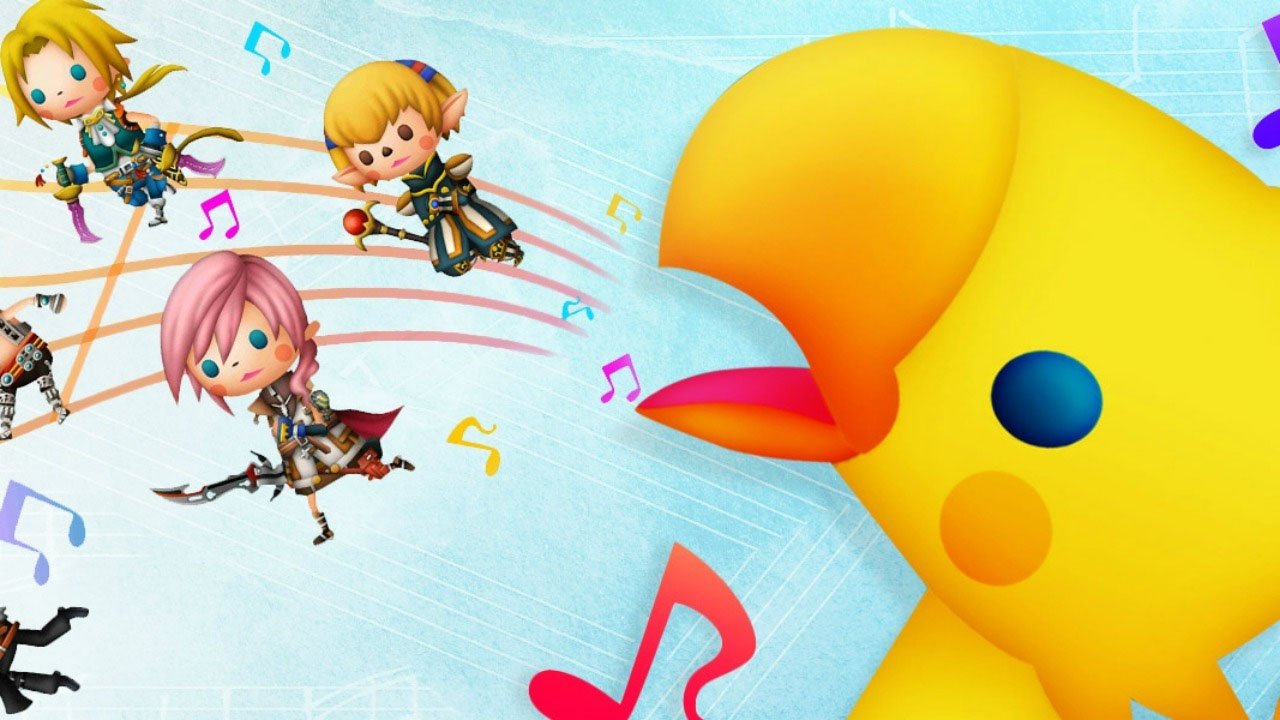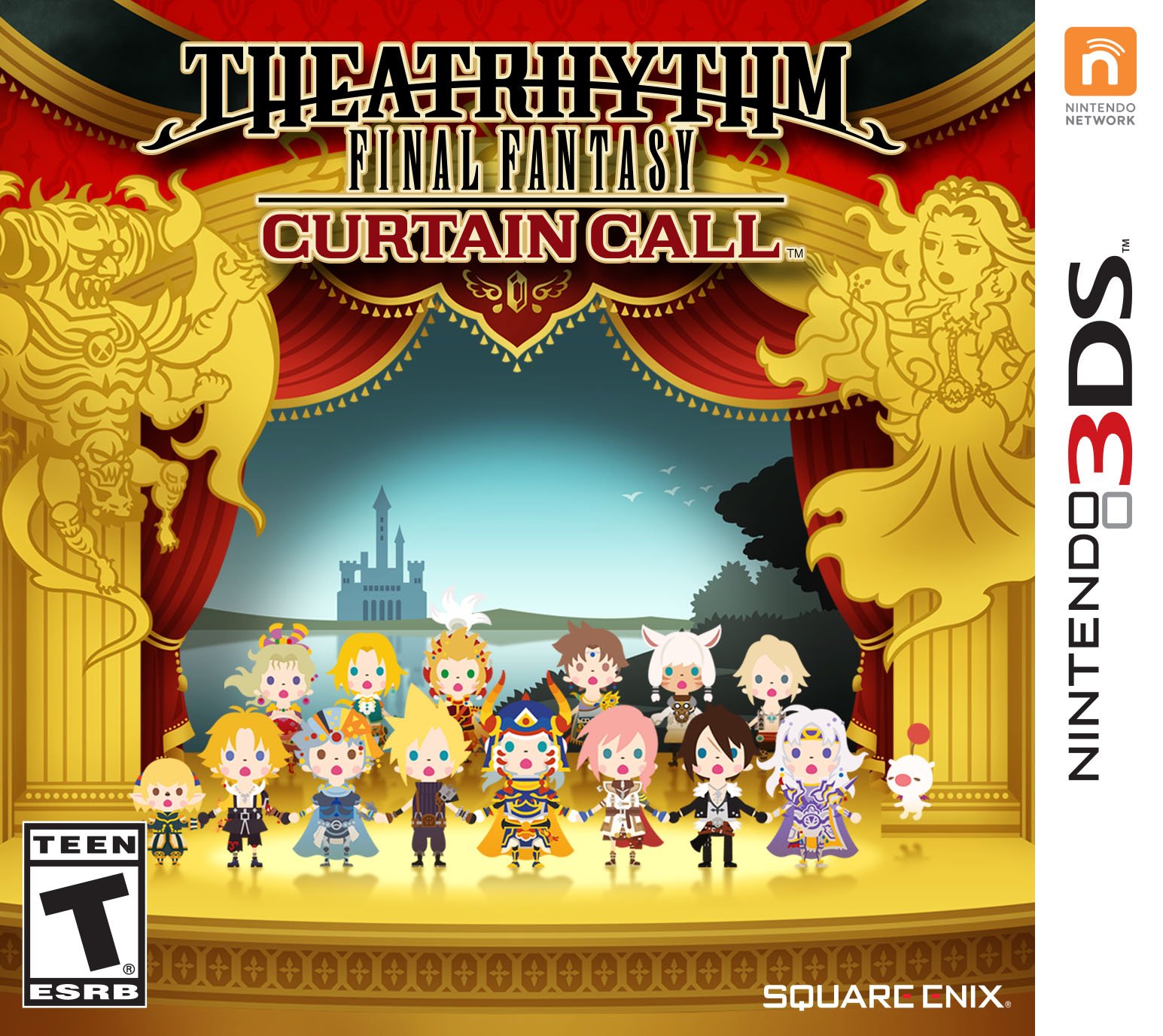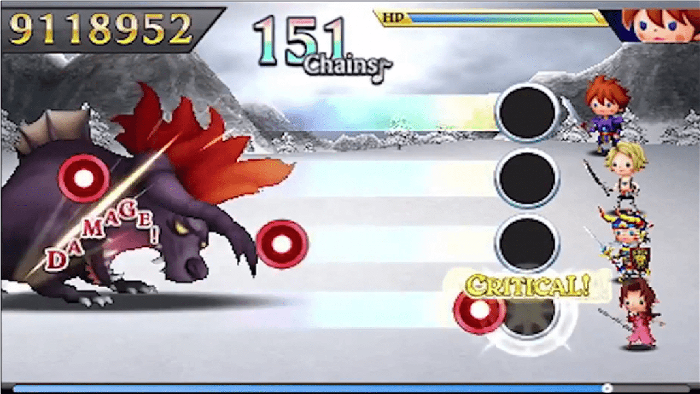Theatrhythm Final Fantasy: Curtain Call is actually the second game in this bizarre Square-Enix mash-up. The original game was released in 2012, and this sequel does what most would expect from any rhythm/music game; tweaked the mechanics and added some new songs. TFF:CC is definitely not going to rise to the top of mainstream popularity list.
It might not even make it to the top of normal genre lists like RPGs and strategy games. But as a niche title, it targets, with laser focus, a very specific group, and while it doesn’t integrate all its different gameplay concepts smoothly, the basic idea of a music game set to Final Fantasy soundtracks is a crowd pleaser, provided you’re an FF music fan.
Rock Band Meets Turn-Based, 4-Party Combat
Like most music/rhythm games, the story of Curtain Call isn’t important, but they have one anyway. Various Final Fantasy characters—in kwaii/super deformed format—are drawn into battles against monsters so that the substance “rhythmia” can be collected to support a war between the gods of Chaos and Cosmos. Instead of the typical turn-based battling and meandering plot normally associated with an FF game, this battling is reliant on the player’s sense of timing and familiarity with classic FF tunes. In other words, Elite Beat Agents crashes headlong into a Harmonix game like Frequency or Amplitude, while taking a detour through the Square-Enix music library and combat scenario museum.
Presentation-wise, this isn’t your typical Final Fantasy experience, but then it’s not a typical FF game. The entire aesthetic of the game is built to be friendly with the limitations of a portable gaming system, so environments are bright, simple and cartoon-y, while characters are cutesy-fied, miniature versions of themselves. It’s fairly common practice in Japanese anime and manga to do this, so there won’t be anything surprising to Otaku, or those familiar with Japanese pop culture, and really, that’s who this game is made for.
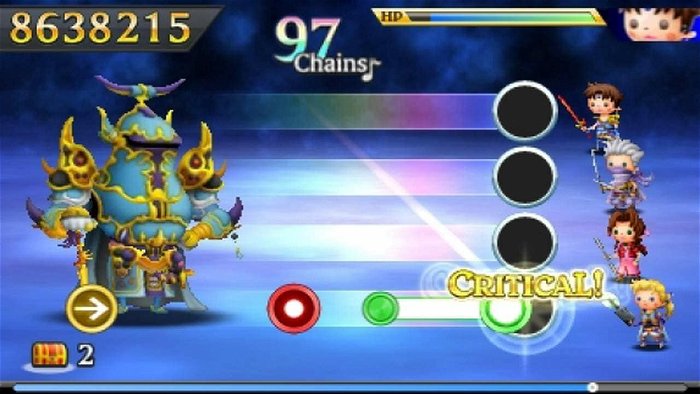
On the audio side, this is one of those rare occasions when it’s strongly recommended to ditch the built-in speakers and play the game with headphones. It’s a music game after all, and the many iconic compositions of the Final Fantasy musical library are the stars of this show. We’re not talking Super Audio CD quality for the sound, but a decent pair of headphones will bring out nuances of the music, particularly more recent tracks like those from FFXIII and FFXIV.
“The entire aesthetic of the game is built to be friendly with the limitations of a portable gaming system..”
Where Curtain Call gets decidedly eccentric is in the way it combines the familiar conventions of turn-based battles in JRPGs with the basic timed input mechanics of rhythm games like the Bemani series, Parappa the Rapper and, of course, the Rock Band franchise. The core of the game’s mechanics are firmly on the rhythm side of things, with the interface allowing for the use of the stylus for Elite Beat Agent style swipes and pokes, traditional buttons and d-pad usage for more of a Parappa experience, or, for the truly progressive, a hybrid style that mixes the two.
Players choose from 200 songs plucked from the FF musical library—not all at once though, more get unlocked as you play—and the goal, as with most music games, is to time inputs to the beat or melody of the song. Fail too often and it’s game over. Succeed, and the game tallies your accuracy, with “SSS All Critical” being the equivalent of the perfectly played “Gold Star” rating from Rock Band.
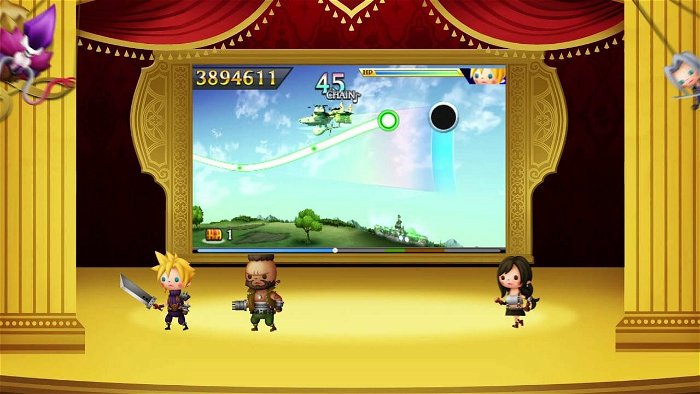
Now, on top of this, a battle-system is layered in. Players choose a total of four party members culled from the various FF games, and they each have their own stats, abilities and hit points. There’s even an option to equip items like potions, Phoenix Downs, and all the other familiar FF inventory items. The usual complexity JRPGs are known for comes in at this point, but is further complicated by the fact that these items and skills may or may not be activated automatically depending on individual characteristics, and that different characters have different advantages based on the type of music you are “battling.”
Music is roughly divided into battle music, that plays the combat tunes from games, field music, that plays town, city and world music from the games, and event music, that plays prominent themes with a cinematic from the game playing in the background. Each mode has a slightly different format for music inputs, demanding different strategies, characters and item uses to maximize effectiveness.
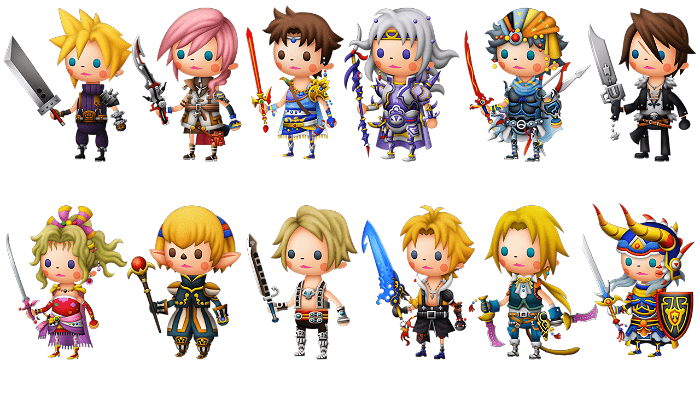
The problem is, this being a rhythm game, ultimately the most important quality is your own sense of timing, and these additional mechanics feel a bit like clunky add-ons that merely add an excessive, unnecessary sense of JRPGness to the proceedings. It’s nice that there’s a potion that heals “hit points” when you get low, but a competent rhythm gamer will never actually use or need it. And THEN, there’s a card collecting mini-game that boosts stats based on what cards you get, and how you combine them on an individual character.
These mixed mechanics then get thrown into three different game modes with three different difficulty levels. The difficulty levels are what you’d expect, with Basic, Expert and Ultimate corresponding to Easy, Medium/Hard and Expert level difficulties on Rock Band or Guitar Hero. The game modes themselves are Music Stage which simply lets you play any available track, Quest Medley, which is a bit like a mini-campaign or a “set list” from Rock Band/Guitar Hero in that a group of songs are played, and a versus mode, which is where skills and items finally come into their own as players compete for the best score on a particular song.
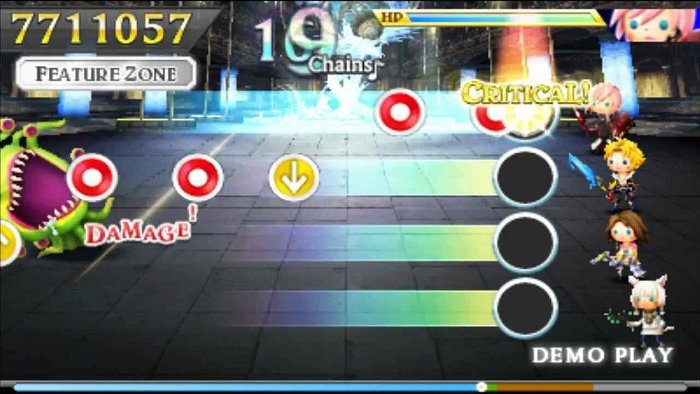
It’s commendable in one sense that Indies Zero wanted to create a music game with depth of a JRPG, to match the heritage of the property being used, but simplicity is the core of a music or rhythm game. The two design philosophies seem at odds with each other, and though they are made to co-exist in Curtain Call, it’s not, ironically, harmoniously. It’s easy to play Curtain Call as a regular rhythm game and ignore the JRPG mechanics entirely, but it’s impossible to do vice versa. The JRPG mechanics won’t save a player with no rhythm and all the Phoenix Downs in the world won’t sleaze a victory from someone that can’t consistently hit inputs at the right time.
Curtain Call still has an enormous library of classic FF tunes, with new ones added from games like FFXIV and Type-0, so there’s still a lot of appeal here. Fans of FF music will still enjoy playing through classic songs like One Winged Angel or Yuna’s J-Pop anthem from FFX-2, and this enjoyable fan service ultimately justifies the purchase. It may not be a great rhythm/JRPG, but it’s a solid FF rhythm game, and for fans, that’s probably enough.
